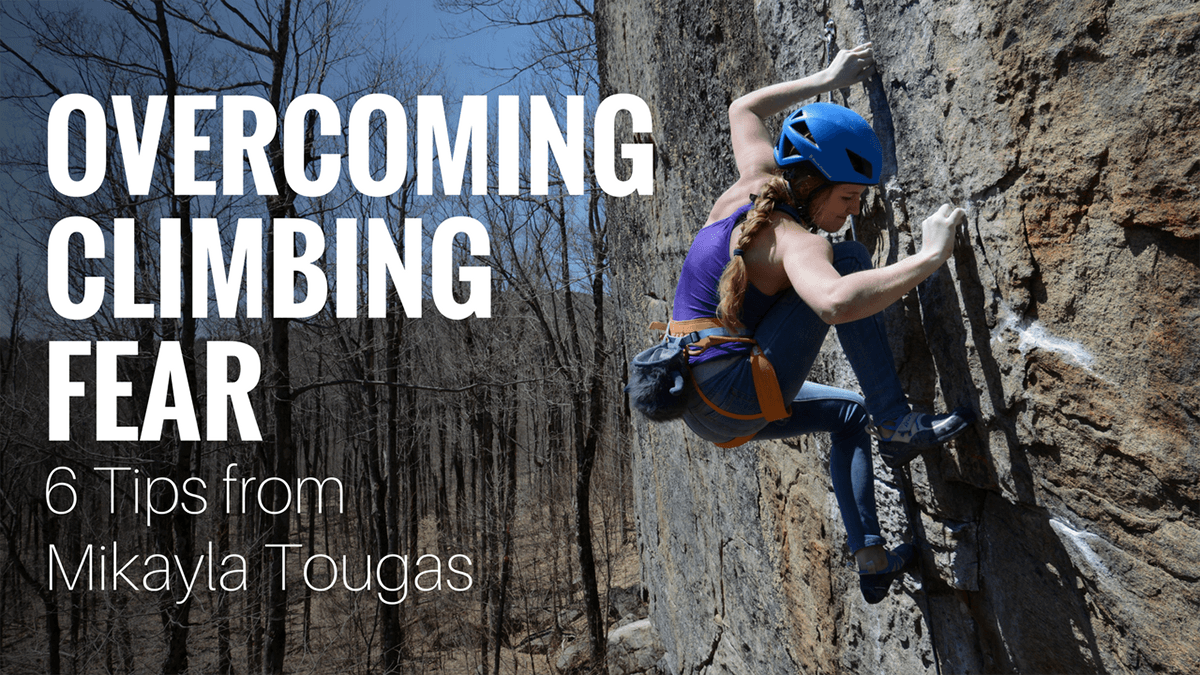6 Tips to Overcome Climbing Fears

Everyone is afraid of something, and many rock climbers face their fears on a daily basis. Some climbers already know how to overcome these mental challenges; however, many are still being held back by them. Until we learn how to control our fear, we are limiting our true potential.
I started climbing almost five years ago. I instantly became obsessed with the sport. A month after I started climbing, I went to my first climbing competition. After that day, I realized I wanted to dedicate my life to rock climbing. Despite my dedication and love for the sport, I am terrified of heights, falling, and failure.
I was at my second USA Climbing SCS Regionals when I promised myself I would not let my fears hold me back from my passion for climbing. At this competition, I was talking to one of the coaches about my fears. I told her how I am terrified of heights. She responded by saying, “Well, maybe this is not the sport for you.”
I was dumbfounded. I could not believe someone I looked up to just told me I should give up my dreams because of fear. From that moment forward, I was determined to prove her negativity wrong. I was not going to let my fear keep me from climbing.
I became committed to finding every trick I could that would help me clear these mental barriers. I wanted to become the best rock climber I could. I wanted to prove that I am stronger than my mind. I was not going to let anything hold me back.
But how did I do it? How did I get rid of my fears? I didn’t. On the contrary, I have taken control over my fears. I do not let them rule me. Six tips that have helped me overcome some of my mental barriers are:
1. Learn When It Is Practical to Be Afraid.
Fears can be rational or irrational. You need to learn when your fears are based on danger rather than discomfort. For instance, if you were doing a high ball boulder in a talus field with no spotters, you have a legitimate reason to be afraid. However, if you are leading in an overhanging cave with nothing to fall into, have good bolts/equipment along with a good belayer, your fear to move above the bolt is irrational.
It is vital to learn to recognize when your fear is practical. Next time you are afraid, ask yourself whether it is because you are in an unsafe position or if you are just uncomfortable with the situation.
2. Don’t Make Excuses because of Fear.
It is too reachy. I cannot dyno. There is no chalk on the holds. The route is awkward. It’s not my style…these are all common climbing excuses.
Most of the time when people make these excuses, they are saying them out of fear. It is human nature to run away from our fears rather than face them. Our excuses provide us with an easy out. They also make it easy to hide your fear from your friends. With each excuse you are reinforcing that fear and letting it control you.
Do not run from the mental challenges. As you begin confronting your fears, you may realize many of your excuses were unjustified.
3. Don’t Let the Bus Hit You.
If a bus was coming straight at you, would you let it hit you or would you move? Despite your fear, you would move (hopefully).
In a climbing scenario, when climbers encounter fear, we don’t always move. We will typically become frozen by the fear. This moment of immobility means that we were just hit by the bus.
Do not let your fear get you run over. Control your mind and keep moving. If you start to become paralyzed by fear, just remember: “Don’t let the bus hit you.”
4. Act Confident.
The first step toward accomplishment is to believe in yourself. If you tell yourself you are afraid and cannot do something, you are reinforcing your fears. You need to approach everything with confidence. Know you can do whatever you set your mind to.
There is no room for fear when you are confident in yourself. Sometimes, it is even beneficial to act overly confident to suppress your fears. Warning: do not confuse confidence with recklessness or arrogance.
5. Learn How to Fall Properly.
Whether you are bouldering or sport climbing, it is important to know how to fall. Many of our fears are linked to injury or traumatic experience. If you know how to fall properly, you are less likely to have a bad experience.
6. Pick Your Partners Wisely.
You need to trust the people you are climbing with. If you are worrying whether your belayer or spotter(s) is going to catch you, you need to find a new climbing partner(s).
Learning how to face our fears and overcome them is not a quick or easy process. It takes time and patience, but do not let the mental challenges of the sport hold you back. Do not let your fears define you. You have the ultimate control over your mind. Seize the power your fears have taken from you and show your real potential!
Big thanks to the people in my life that have helped me overcome my mental barriers, especially my parents, my coach Chris, and my friend/mentor Meghan.
Mikayla is a Butora Athlete, 2016 Collegiate National Champion, and a member of the US Team. Keep up with her on Instagram @mikaylatougas





